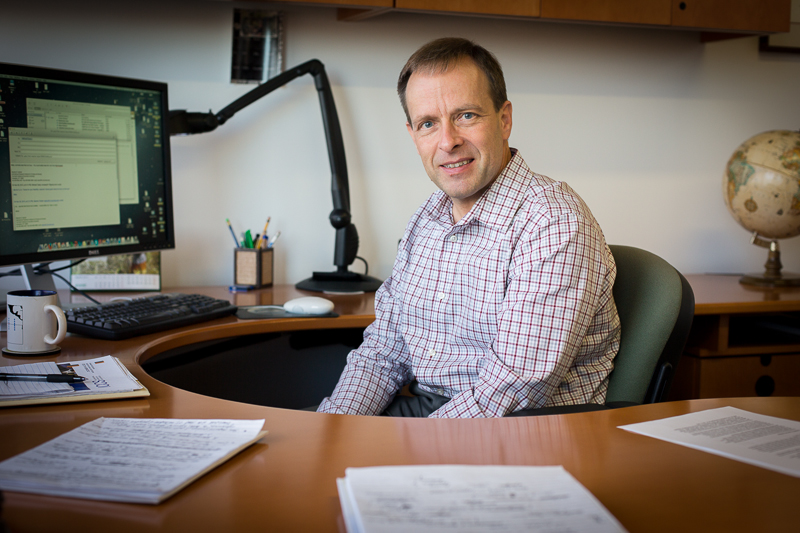Q&A – Steve Zebiak on Climate Services Conference

Stephen Zebiak, Director of the Climate Services Partnership at the Earth Institute at Columbia University.
Stephen Zebiak is head of the Climate Services Partnership Secretariat, and Senior Research Scientist at the International Research Institute for Climate and Society. The Climate Services Partnership is an informal collaborative platform to advance knowledge, tools, and capacities in the delivery of science-based climate services to inform practical decision and policy making. Previously, Zebiak was Director-General of IRI for nine years, leading an interdisciplinary team of more than 40 scientists specializing in climate prediction, agriculture, health, water, economics and development policy.
We asked him a few questions about the upcoming International Conference on Climate Services in Jamaica, from December 4 to 6.
Q: What are climate services?
Climate services are the provision of science-based climate information, appropriately tailored, and communicated to individuals and organizations to improve their decision and policy processes. They may take the form of food security early warning systems, for example, or farmer advisories and flood risk assessments.
Q: This is the third International Conference on Climate Services. In what ways has the conference changed since the first one was held in 2011 in New York?
The ICCS process has reflected growing interest and investment in climate services over the past few years. The number of organizations and individuals who have actively contributed to developing the conference has grown several-fold over the past couple of years. ICCS 3 will include researchers, providers, users, and funders of climate services from all regions of the world.
Our agenda has also grown substantially since the first conference. This year, we will explore a rich range of topics that are of interest to the climate services community, including ethics, investment approaches and emerging research priorities. We are also very happy to introduce a Tools Expo. Nearly thirty organizations have signed up to demonstrate a suite of tools and resources of interest to the community.
Our intention with the annual conference has always been to create a forum to present and discuss outstanding issues and new ideas and to catalyze new actions. We’ve accomplished this in a number of key areas, for example in conducting case studies to capture knowledge globally and in developing methodologies for effective climate services valuation and evaluation. Of course, there are lots of things left to do.
Q: How has the Climate Services Partnership evolved over the last two years?
The CSP was created as an outcome of the first conference in 2011, to foster knowledge sharing and collaboration with the intent of improving climate services development and practice. Our activities in these areas have developed substantially over two years.
For instance, we have formed Working Groups on economic valuation, and evaluation of climate services and other topics. We’ve convened a number of workshops and partner meetings and conducted case studies, evaluations, and analyses of findings. We have created and distributed communications and knowledge resources, including a newsletter, the Knowledge Exchange (a web-based forum for presentation and dialogue), and a website. As a result, we engage more participants, in more and different ways — and are much better connected as a network than when we began.
We have even greater ambitions for the future. We want to create a rich repository of knowledge, clearinghouse of good practices, and market place for new ideas, innovations, and programs.
Q: How have climate services developed and changed in the last few years? Where do you see the most exciting areas of growth and innovation? Any success stories you’d like to highlight?
At the international level, the formal launch of the Global Framework for Climate Services represented a major set of commitments from governments around the world to promote effective climate services. More locally, we’re seeing novel approaches to address major challenge areas such as user engagement, communications, and institutional arrangements to support climate services.
I should stress that there still are not universal answers to the challenges of creating effective climate services. We’re learning more every day, and we need to ensure that all involved have the full benefit of what’s being learned. This is an area where Climate Services Partnership can make a difference, and it is a strong motivation for us going forward.
In terms of the CSP specifically, we’ve been happy to facilitate the transfer of knowledge regarding the establishment of effective services from Uruguay and Ethiopia to Jamaica, for instance. We’ve also been happy to broker investments in data rescue and the development of guidance materials. We’re looking forward to do more of this sort of brokering in the future.
Q: What do you hope will be the key outcomes of ICCS 3 in Jamaica?
In general we hope that the participants of ICCS3 will come out of the conference better informed, better prepared, and re-invigorated to advance climate services. We also expect conference deliberations to help us sharpen our sense of needs and priorities for future work in specific areas – and for some cross-cutting areas including capacity building, stakeholder engagement and establishing good practices. From the findings of ICCS3, we expect, will come clear guidance to inform the work plans and activities of the CSP.

You must be logged in to post a comment.